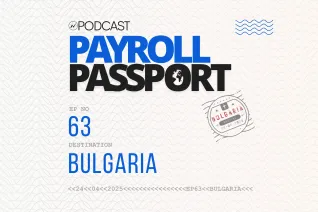Establish your presence globally with Neeyamo as we help you go beyond borders to manage your international payroll services and hire new talent in Bulgaria.
Overview
Worldwide, it has been agreed that nodding your head indicates a yes, and shaking your head indicates a no. But, in Bulgaria, the signs are reversed: nodding your head means no, and shaking your head means yes. This may be tricky to understand for those visiting Bulgaria for the first time, just like how maneuvring the payroll in Bulgaria is tricky as well. Neeyamos global payroll services ease the process for companies looking to outsource their global payroll requirements and aid them in maneuvering the tricky payroll system in Bulgaria.
Neeyamo – Global payroll providers assist organizations worldwide with onboarding and managing employees in Bulgaria -processing payroll, managing local compliance requirements, benefits, and more.
Tools And Instances
Facts And Stats
Capital
Sofia
Currency
Bulgarian Lev (BGN)
Official Language
Bulgarian
Fiscal Year
1 January - 31 December
Date Format
DD/MM/YYYY
Country Calling Code
+359
Other Languages
Turkish and Romanian
Time Zone
UTC + 02:00
Global Payroll
Overview
What is Global Payroll?
Handling payroll for a widespread workforce can pose a significant challenge for any organization, and the added compliance complication can worsen things. If companies spend more time processing payroll, it directly impacts day-to-day operations and their overall productivity.
Over the years, Neeyamo has observed these complexities and strived to provide a global payroll solution through a single technology platform - Neeyamo Payroll.
What is a Payroll System?
A payroll system is software that is used to manage employee payments, inclusive of their wages, deductions, bonuses, etc. Global payroll processing is typically done with the assistance of an outsourced payroll provider.
Payroll Associations
The Global Payroll Association (GPA) is instrumental in supporting individuals and organizations engaged in payroll and its related functions. These associations offer many advantages that foster professional growth, facilitate networking prospects, encourage knowledge exchange, and promote industry advocacy.
Payroll Taxes
Payroll tax is the percentage amount retained from an employee's salary and paid to the government to invest in the general population's welfare. These are statutory in nature and are levied from both the employer and employee. Additional statutory contributions are made by employers towards aiding both short-term and long-term benefits for their employees.
Employee Taxes
- 10.58% - Social Security (Employee’s Contribution: New: BGN 569.11 (up from BGN 516.75))
- 8% - Health Insurance
- 18.58% - Total Employee Cost
Employee Income Tax
- 10.00% - Flat Rate
Employer Taxes
- 13.72% - Social Security (Employee’s Contribution: New: BGN 569.11 (up from BGN 516.75))
- 8% - Health Insurance
- 0.40% - 1.10% - Accident at Work & Occupational Illness Fund
Payroll Cycle
Overview
Undoubtedly, payroll is a critical process for any organization. The pay cycle in Bulgaria refers to the period for which an organization pays its employees, and this can vary depending on the pay frequency that the organization chooses to adopt.
Frequency
The payroll cycle in Bulgaria is generally monthly, with payment being made on the last working day.
13th Month Cycle
There are no provisions in the law regarding 13th salaries.
Global Work
Overview
An Employer of Record services / EOR services provider helps you eliminate the hassle of handling complexities while onboarding a new employee in an international location. They help bridge the gap that otherwise mandates organizations to have a locally registered entity and a local bank account before making a job offer to an international hire.
Employer of record companies act as legal employers, facilitate salary payments, and manage other statutory requirements such as health insurance, payroll taxes, and employee benefits, ensuring compliance with local tax laws and regulations.
This allows organizations to focus on collaborating with the employee in Bulgaria for operational tasks, with the knowledge that they have a cost-effective solution to support their global payroll & HR requirements as they continue their global expansion.
HR Mandates and Practices
Minimum Wage
Effective January 1, 2025, the monthly minimum wage will increase to 1,077 Bulgarian leva (US$600.62), up from 933 leva (US$520.31).
Overtime
Work above the standard workweek of 40 hours is paid as overtime and regulated by employment contracts or collective agreements. In general, overtime maximum limits are set at 3 hours per day (across two consecutive days), 6 hours a week, 30 hours a month, and 150 hours per year.
Overtime hours are paid at 150% of the standard salary rate for working day hours, 175% for weekend hours overtime, and 200% for working on public holidays.
Data Retention Policy
In Bulgaria, all payroll-related documents must be stored for 50 years. Tax records generally must be kept for a minimum of 10 years, and all other documents should be stored for three years.
Hiring and Onboarding Requirements
Hiring
Before starting to hire or advertise recruitment, employers should organize and plan their approach, carefully considering the content and the design of the job advert and the most appropriate time to publish it. They should also identify the most suitable media for advertising the job to reach an appropriate audience.
- Preparing a job description and person specification can provide a valuable basis for designing a job advertisement to advertise recruitment.
- All forms of job advert are covered by the Equality Act 2010.
- Employers must not publish adverts that indicate or reasonably indicate an intention to discriminate.
- Adverts should contain enough information about the job and the organization to help applicants decide if they are suited.
- Adverts must not target applicants with a particular protected characteristic unless this is an occupational requirement or lawful positive action.
- Positive action may be used to encourage applications from under-represented groups.
- Relying upon 'word of mouth' recruitment has the potential to discriminate indirectly.
- Employers may be liable for the discriminatory actions of third-party advertising on their behalf.
- Employers must not pressure third parties to discriminate in the recruitment process.
- Employers must provide temporary agency workers/fixed-term employees with information on relevant job vacancies.
Special Provisional Acts
Whistleblower Protection Act:
Effective from May 4, 2023, the WPA aims to safeguard those who report or make public information about violations of EU or Bulgarian legislation. However, the people impacted by the report or disclosure are entitled to compensation for pecuniary and non-pecuniary damages if the whistleblower knowingly reports or makes public false information. In cases of violations of the aforementioned prohibition, the whistleblower is also entitled to compensation for pecuniary and non-pecuniary damages suffered as a result of the violation.
Onboarding
The following documents are required:
- Name
- Address
- Date of place
- Number of a personal card or other identification document and civil ID number
- Educational and Qualification Certificate
- Previous Employment history/ certificate
- Copy of passport
- Copy of driving license
Probation
The parties may agree to a probationary period of up to six months when the nature of the work requires confirmation of the employee's ability to perform it or where the employee wishes to verify that the work is suitable. In practice, the parties to any employment contract may agree to a probationary period.
Leave
Public Holidays
Bulgaria recognizes 15 Public holidays.
Employers are required to give employees holidays as non-working days with full pay. Employees working on holidays are entitled to double their normal remuneration.
The Labor Code specifies paid holidays. The holidays set by the Labor Code are as follows:
- Jan 1: New Year's Day
- Mar 3: National Day
- Apr 14: Orthodox Good Friday
- Apr 16: Orthodox Easter
- Apr 17: Orthodox Easter Monday
- May 1: Labor Day
- May 8: Durdevdan
- May 24: Day of Slavonic Alphabet, Bulgarian Enlightenment and Culture
- Sept 6: Unification Day
- Sept 22: Independence Day
- Dec 24: Christmas Eve
- Dec 25 and Dec 26: Christmas
Annual Paid Leave:
The minimum paid annual leave is equal to 20 working days for employees who have worked for employers for at least eight months. The Labor Code states that all annual paid leave must be used during the year earned. Upon termination of employment, employees are entitled to compensation for unused annual leave.
Hence, an employee can use the paid annual leave until the end of the respective calendar year unless its use is postponed.
Postponement of Use of Leave – The use of the paid annual leave may be postponed for the next calendar year by –
- The employer due to important production reasons;
- The employee when he uses another type of leave or at his request with the consent of the employer.
When annual leave is postponed or not used until the end of the calendar year in which it is due, the employer shall ensure the employee uses it during the next calendar year, but no later than 6 months, for which it is applied. If the employer has not allowed the use of the leave, the employee shall have the right to determine the time of its use by notifying the employer in writing at least 14 days in advance.
The employee is entitled to additional paid annual leave:-
- For work under specific conditions and risks to life and health, which cannot be eliminated, limited, or reduced, regardless of the measures taken of not less than 5 working days;
- For work on a non-standard working day – not less than 5 working days.
Sick Leave
The employer pays 70% of the basic income for the first three days of sickness.
Maternity Leave
Employers must give pregnant employees paid maternity leave of at least 410 days, 45 of which are used before the birth. Employees receive compensation during this time from the NHIF in an amount equal to 90% of the average gross salary or the average daily income on which social security contributions have been calculated.
Paternity Leave
New fathers are entitled to 15 days of paid leave at a rate of 90% of their basic income.
Parental Leave
Employers are required to allow parental leave to raise the child until the child reaches the age of two. The leave may be transferred to the father or grandparents.
Other Leave
Marriage Leave:
Employers must give employees two days of paid leave in the event of their marriage.
Bereavement Leave:
Employers must give employees two days of leave to attend a family member's funeral.
Leave for the Performance of Civic, Public, and Other Duties:
Employees shall be entitled to leave from work in the below cases:
- upon marriage – 2 working days;
- in case of blood donation – for the day of the examination and blood donation, as well as 1 day after it;
- in the event of the death of a parent, child, spouse, brother, sister, and parent of the other spouse or other relatives in the direct line – 2 working days;
- when summoned to court or by other bodies as a party, witness, or expert;
- for participation in sittings as a member of a representative state body or a juror;
- for participation in meetings of a special negotiating body, a European Works Council, or a representative body in a European commercial or cooperative society;
- when the employer has given a notice for termination of the employment relationship – 1 hour per day for the days of the notice. This right cannot be used by an employee who works 7 hours or less;
- for the time of training and participation in the voluntary formations for protection in case of disasters.
Leave during active and term in the voluntary reserve:
- An employee or worker called up for active service in the volunteer reserve shall be deemed to be on official leave for the duration of the event/service, including the days of traveling.
- Should the active service in the volunteer reserve last for 15 days or more, the worker or employee shall be entitled to two calendar days of unpaid leave before departure and two more days following his return.
- For the duration of the leave under Para. 2, the worker or employee shall be paid remuneration for the account of the budget of the Ministry of Defence.
Paid leave for two or more living children:
An employee with two living children up to the age of 18 is entitled to paid leave of 2 working days, and an employee with three or more living children up to the age of 18 is entitled to 4 working days of paid leave for each calendar year if agreed in a collective labor agreement. that This leave is used when the employee wishes and cannot be compensated with monetary compensation, except upon termination of employment.
The employee shall have the right to use the leave, including for the calendar year in which any or all children reach 18 years of age.
Paid Study Leave:
An employee who studies at a secondary school or higher education without leaving the employment with the consent of the employer is entitled to paid leave of 25 working days for each school year. The leave shall be used independently of all other types of leave. It can be used all at once or in parts and is not provided to an employee who repeats the school year.
Exam Leave:
An employee shall be entitled to paid leave if he applies to a school where admission is by examination:
when applying to a secondary school – 6 working days;
When applying to a higher school or for doctoral studies – 12 working days.
When the consent of the employer has not been given, the employee shall be entitled to half of the leave duration given above but as unpaid leave. When the employee has used paid or unpaid leave stated above but has not been admitted to the respective educational institution or as a doctoral student, he is entitled to unpaid leave in an amount equal to half of the leave given under the paid exam leave for the following years. Labor Code, Sec 170.
Adoption Leave:
An employee who adopts a child up to 5 years of age is entitled to leave for a period of 365 days from the day of the transfer of the child for adoption, but not later than reaching the age of 5 years. When the child is adopted by spouses, the leave with the consent of the adoptive parent may be used instead by the other adoptive parent after 6 months from the day of transfer of the child for adoption, but not later than reaching the age of 5, when working under an employment contract.
Termination
Termination
An employee can be provided with written notice in case of termination
Notice Period
The notice period is equal to the employee's pay period. The notice period is one month if the employee is paid on a monthly basis. The notice period is one week if the employee is paid weekly.
If an employee is fired due to misconduct or subpar performance, no notice is necessary.
Severance Pay
An employee is eligible for severance pay after 60 consecutive months of employment with the company. Severance pay is calculated as per the day of pay for each month until 60 months of employment, with 2 adds added for further months.
Visa
Visa
Foreign employees are generally subject to the same workplace and tax legislation as Bulgarian nationals. They also have the same legal rights. With a valid ID or passport, EU nationals, Schengen participants, EEA participants, and Swiss nationals may freely stay in Bulgaria for up to three months. According to the Law on Employment Promotion, foreign nationals must get a work permit from the Employment Agency through their planned employer. This permission is valid for one year and may be extended for two additional years if necessary.
Individuals from the EU, EEA, or Switzerland may be given temporary residence certificates for up to five years. Once this period has passed and they have resided in Bulgaria legally for more than five years, nationals of the EU, EEA, and Switzerland may apply for a permanent residency certificate.
Bulgaria offers three different types of visas:
For airport passage (Visa A)
Short-term, transitory, or intended stay (Visa C)
For an extended stay, non-EU citizens who entered Bulgaria with a Type D visa may be given residence permits for up to a year.
Requirement of Work Visas
The following documents are required:
- Filled Visa application form
- Passport
- Photocopies of prior visas
- Recent passport-size photo in line with Bulgaria visa picture requirements
- Travel itinerary
- Proof of travel insurance of at least €30,000 for the duration of your stay
- Proof of accommodation.
- Proof regarding the purpose of travel.
- Proof of sufficient financial means to support yourself during your stay
- Certificate of police clearance (if necessary)
Employee Background Checks
Legal and Background Checks
Background checks can be made and are generally conducted by requiring the applicant to produce several documents, which should be presented to the employer before entering an employment contract. These documents consist of two main types:
Legally required: Bulgarian Ordinance No. 4 on the Documents Necessary for Execution of an Employment Agreement provides a list of legally required background documents. Some of these apply to all employees, and some depend on the type of assigned work. Generally, required documents include the following:
A criminal record certificate is also required for some specific jobs, but only if that is explicitly regulated in the legislation.
- Medical certificate evidencing the applicant's general health status;
- The document evidencing a specific professional qualification or capacity;
- Limited personal data is needed to identify the employee only.
Required by the employer: The employer can also require specific additional documents, but only if these documents relate to the performance of the job (for example, a requirement to provide a criminal record certificate for the role of an administrative assistant will not be justifiable) and are envisaged by law. Further, the employer must comply with all personal data protection and anti-discrimination requirements when obtaining personal information from a potential employee.
For example, an employer will violate the Law on Protection of Discrimination and can be subject to sanctions if it requests information concerning the employee's racial or ethnic origin, political, religious, or philosophical convictions, sex life, and so on, without a legitimate aim. A third party cannot process the personal data of an employee or job applicant without their knowledge and prior consent unless the data is publicly available.
Last updated on April 16, 2025
If you have any queries or suggestions, reach out to us at irene.jones@neeyamo.com
Have Queries? Get In Touch With Us
Get in touch with one of our experts and take a quick demo of our services









